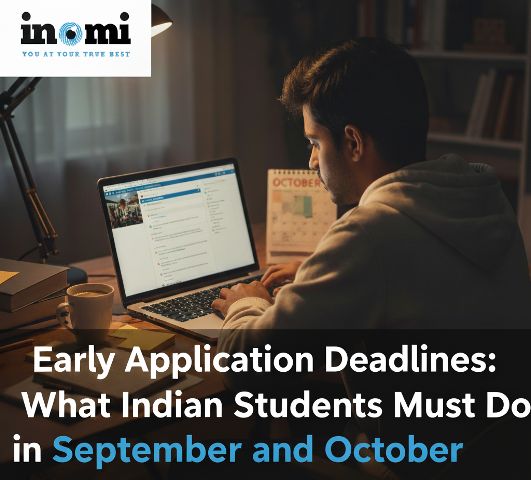
For Indian students looking to study at the world’s best universities, September is an important month—particularly if you are thinking of an Early Action (EA) or Early Decision (ED) application in the US. With most EA/ED deadlines typically scheduled for early November, the next few weeks are crucial for preparing your application materials. Additionally, Diwali is comparatively earlier this year (October 20-21) – just a few days before the November 1 deadline. So, planning is critical this year. Here are a few key tips for early application deadlines.
Tips for Early Application Deadlines: What Indian Students Must Do in September and October
Here’s a helpful checklist for Grade 12 students to remain on track this September:
1. Complete Your College List
Research intensively: Shortlist where you will be applying Early Decision or Early Action. Keep in mind ED is binding, so pick a college where you feel strongly about fit and cost. Here is a brief guide on REA vs EA vs ED vs RD: Which College Application Plan Should You Choose!
Balance the list: Maintain a balance of “reach,” “match,” and “likely” schools. If you are also planning to apply to the UK (UCAS) or Canada in addition to US schools, then prepare accordingly.
Verify deadlines: Some US schools have varying schedules for EA/ED, UCAS (UK) has the October 15th deadline for the Oxford, Cambridge, Medicine, Dentistry, and Veterinary courses, and Canadian deadlines are possibly opening soon.
2. Sharpen Your Essays and Statements
Common App Essay: Should be at near-final draft stage by September. Be true to yourself—write in your voice and tell your story. Here are tips on how to approach the Common App Essay prompts.
Supplemental Essays: Every university has specific prompts (e.g., “Why Us?” essays). Begin writing now to prevent last-minute stress. Read how to write effective supplemental essays.
UCAS Personal Statement: Applying through UCAS? Keep in mind that the essay is about academics and passion for the subject, not personal anecdotes. There have been some changes in the UCAS essay requirements. Learn how to approach the new UCAS personal statement (for 2026 entry).
3. Gather Recommendation Letters
Ask early: Educators require time to craft thoughtful letters. Approach them in September so that they are not under pressure.
Offer context: Give them your resume, academic awards, and particular anecdotes they may incorporate.
Counselor recommendations: In US schools, school counselors also send in a report. Ensure they possess your updated information.
Related Article: How to Get Impactful Letters of Recommendation (LORs) for College Applications
4. Update Your Resume / Activity List
Emphasize impact: Do not merely enumerate activities—depict leadership, initiative, and outcomes.
Keep it concise: The Common App allows for 10 activities with character limits, so prioritize accordingly. Learn more about how to fill out the Activities List to stand out in the applicant pool.
Include summer and recent work, such as internships, research projects, or community service, from summer 2025.
5. Review Standardized Testing Plans
SAT/ACT: If you’re taking October test dates, register now and finalize prep.
English Proficiency Tests: Many universities require IELTS/TOEFL/Duolingo for Indian students. Book your test slots early.
Test-Optional Strategy: If your scores are not representative of your actual potential, look to see if your target schools are test-optional.
6. Arrange Supporting Documents
Transcripts: Get your school to prepare official transcripts in the appropriate format.
Predicted Grades: UK universities need predicted grades; arrange with teachers to secure accurate predictions.
Financial Documents: For US schools, begin preparing the CSS Profile and FAFSA (where applicable), as financial aid deadlines might coincide with early applications.
7. Make a Timeline and Be Disciplined
Make September your goal-setting month—e.g., complete your Common App essay this week, write two supplement essays next week, and ask for recommendations mid-month.
Don’t leave October tasks for the eleventh hour; procrastination can compromise your application quality.
Timeline and Tasks Summary for Early Application Deadlines
| Time Period | Key Tasks & Focus Areas | Why It Matters |
|---|---|---|
| September | This month is your “preparation window.” Once you enter October or November, deadlines will be looming, and you need polished materials ready. | • Finalize your college list, and decide which ones you’ll apply to Early (EA/ED) vs. Regular. • Begin drafting Common App essay and “Why X school” / supplementary essays. • Request recommendation letters from teachers, giving them ample time. • Update your activity list/resume, include recent summer projects, research, and internships. • Take or register for SAT/ACT / English tests (TOEFL, IELTS) if required. • Prepare transcripts, predicted grades (for UK/others), and gather supporting documents. • Map out a detailed timeline with weekly targets (e.g. essay drafts, revision, submission). |
| October | • Finalize your college list, and decide which ones you’ll apply to Early (EA/ED) vs. Regular. • Begin drafting Common App essay and “Why X school” / supplementary essays. • Request recommendation letters from teachers, giving them ample time. • Update your activity list / resume, include recent summer projects, research, and internships. • Take or register for SAT/ACT / English tests (TOEFL, IELTS) if required. • Prepare transcripts, predicted grades (for UK/others), and gather supporting documents. • Map out a detailed timeline with weekly targets (e.g. essay drafts, revision, submission). | • Finalize and polish your essays and supplements. • Continue following up with recommenders; provide any material (bullet points, highlights) to help them write. • Have an “application review week” where you or a mentor proofreads all parts. • Begin filling in application forms (Common App, Coalition, school portals). • Ensure test scores (SAT/ACT/English) are sent to your target schools. • For UK/Cambridge/Oxford, confirm your UCAS personal statement and subject-specific preparations. • Prepare for financial aid or scholarship documents (especially for ED or EA, where deadlines may coincide). • Submit early applications (EA/ED) before early November deadlines. |
Tanmoy Ray is an experienced admissions consultant and content marketer with a passion for helping students achieve their global education dreams. After completing his Master’s degree in the UK, he worked with leading universities including the University of Oxford (UK), Utrecht University (Netherlands), and the University of New South Wales (Australia). Tanmoy combines his deep expertise in higher education with a talent for crafting student-focused resources that simplify complex admissions processes.
